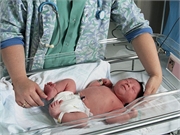
MONDAY, Nov. 25, 2019 Exposure to opioids in the womb may affect an area of the newborn brain that regulates emotions, a new study shows. Researchers used MRIs to assess brain activity in 16 full-term infants while they slept, specifically focusing on connectivity in a region called the amygdala, which is responsible for emotions such… read on >





























